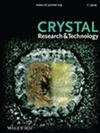4 -氨基苯甲酸喹啉盐:一种用于光电应用的三阶非线性光学材料的线性-非线性光学和量子化学研究
IF 1.9
4区 材料科学
Q3 CRYSTALLOGRAPHY
引用次数: 2
摘要
采用溶液生长技术,制备了非线性光学材料4 -氨基苯甲酸喹啉(ABAQ)的高质量单晶。晶体结构通过单晶X射线衍射研究得到证实。ABAQ化合物的生长晶体通过粉末X射线衍射、傅里叶红外变换、热分析和力学研究进行了表征。紫外-可见-近红外光谱(UV-vis-NIR)和光致发光光谱反映了所得化合物的光透射范围。通过介电研究和激光损伤阈值测量来验证生长晶体的非线性活性和表面电阻。根据Kurtz Perry粉末技术,ABAQ化合物的二次谐波产生效率估计为标准磷酸二氢钾的90%。采用Z -扫描技术研究了ABAQ晶体的非线性行为。ABAQ材料在光限幅和开关应用中的适用性也得到了验证。利用密度泛函理论对ABAQ分子的稳定几何结构进行了计算分析,有力地支持了具有重要化学背景的实验结果。通过研究电偶极矩、极化率和超极化率等各种非线性光学参数,确定了标题化合物的非线性行为。基于这些推断,ABAQ材料可以被宣布为光电子领域的光限制和开关应用的有前途的材料。本文章由计算机程序翻译,如有差异,请以英文原文为准。
Linear‐Nonlinear Optical and Quantum Chemical Studies on Quinolinium 4‐Aminobenzoate: A Third Order Non‐Linear Optical Material for Optoelectronic Applications
Good quality single crystals of a non‐linear optical (NLO) material, quinolinium 4‐aminobenzoate (ABAQ), are grown by employing solution growth technique. The crystal structure is confirmed via single crystal X‐ray diffraction studies. Grown crystals of the ABAQ compound are characterized by powder X‐ray diffraction, Fourier transform infrared, thermal analysis, and mechanical studies. Ultraviolet–vis–near infrared (UV–vis–NIR) and photoluminescence spectra reflect the optical transmission range of the obtained compound. Dielectric studies and laser damage threshold measurement are carried out to verify the non‐linear activity and surface resistance of the grown crystal. From the Kurtz Perry powder technique, the second harmonic generation efficiency of the ABAQ compound is estimated to be 90% that of the standard potassium dihydrogen phosphate. Z‐Scan technique is performed to investigate the non‐linear behavior of ABAQ crystal. The suitability of ABAQ material for optical limiting and switching applications is also verified. Computational analysis performed upon the stable geometry of ABAQ molecule using density functional theory strongly supports the experimental findings with a significant chemical background. The non‐linear behavior of the title compound is determined by investigating various non‐linear optical (NLO) parameters of electric dipole moment, polarizability, and hyperpolarizability. Based on these inferences, the ABAQ material can be declared as a promising material for optical limiting and switching applications in optoelectronics regime.
求助全文
通过发布文献求助,成功后即可免费获取论文全文。
去求助
来源期刊
自引率
6.70%
发文量
121
审稿时长
1.9 months
期刊介绍:
The journal Crystal Research and Technology is a pure online Journal (since 2012).
Crystal Research and Technology is an international journal examining all aspects of research within experimental, industrial, and theoretical crystallography. The journal covers the relevant aspects of
-crystal growth techniques and phenomena (including bulk growth, thin films)
-modern crystalline materials (e.g. smart materials, nanocrystals, quasicrystals, liquid crystals)
-industrial crystallisation
-application of crystals in materials science, electronics, data storage, and optics
-experimental, simulation and theoretical studies of the structural properties of crystals
-crystallographic computing

 求助内容:
求助内容: 应助结果提醒方式:
应助结果提醒方式:


